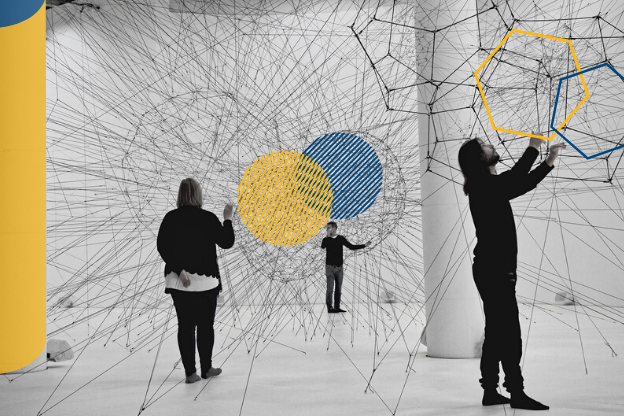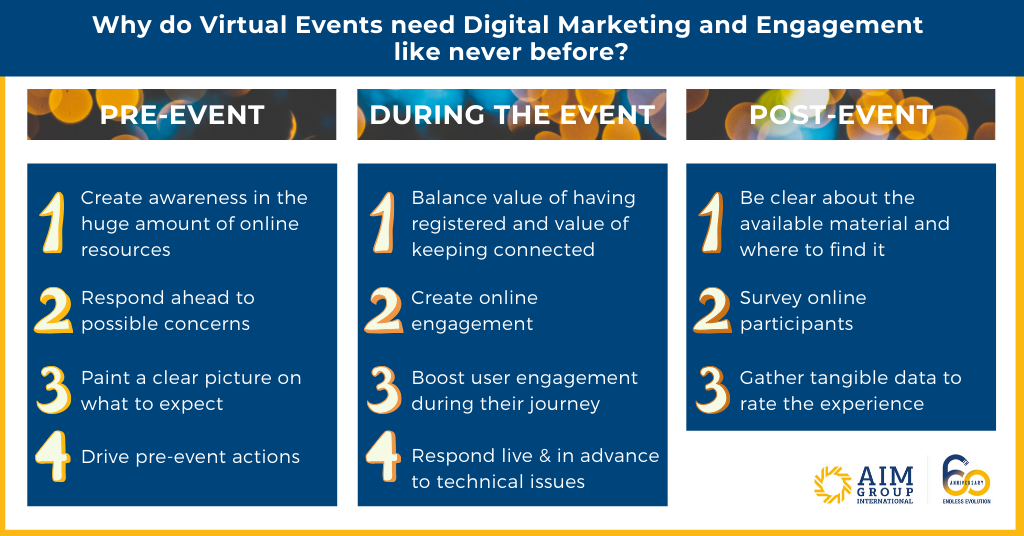
Why Virtual Events need Digital Marketing and Engagement like never before?
by Giulia Ineke Sarri, Marketing & Communication Specialist, AIM Group International
Each event has its own story, its own value and purpose. Other than that, it also has its own audience. In order to effectively reach and engage that audience, we must create a digital marketing strategy. Such a strategy requires us to look for the answers to key questions, “what is the goal of the event?” and “what makes this event unique?”. The audience itself must be wondering the same thing, so using digital marketing channels becomes crucial to position your event as a way to solve your audience’s problems or queries.
But hey… what changes when live events can’t happen and when virtual solutions are the new way to meet? How can we offer something of meaning to our audiences if we are constantly receiving links to webinars, online resources, podcasts and recordings?
We, at AIM Group International, are providing our clients with solutions to exploit the online stage for their events, but also we are putting much value into all those collateral services and solutions to enrich the journey of our clients amongst innovative formats they are approaching for the first time. We are designing new pathways for organizations in order to enhance their online presence by revising their visual identity, refactoring their website, reformulating their communication channels to effectively promote their activities, as well as identifying effective opportunities for sponsors to showcase their offer.
In addition to that, we find that Digital Marketing has never been so important before, during and after a Virtual Event. Let’s see what the opportunity is for event marketers:
- BEFORE THE EVENT:
- Create awareness amongst the huge amount of online resources – there is much noise out there, but this does not mean that our virtual event should not be showing up among the best our audience can get online!
- Respond ahead to possible concerns – an offline audience is used to packing their suitcase and being ready for some days of nice face2face networking. Digital channels are there for them to answer to all of their possible concerns before going live.
- Paint a clear picture on what to expect – as mentioned, offline audiences are not used to this kind of experience, so stating clearly what they should expect means being transparent, while building Trust.
- Drive pre-event actions – leading a potential delegate through his/her digital journey (download an application or register properly, etc…) is a good way to make sure everything is set, so that the online experience can start flawlessly.
- DURING THE EVENT:
- Balance value of having registered and value of keeping connected – depending on how much of the content is being made available after the event, it will be crucial to continue to underline the importance of keeping connected or encouraging people to enjoy the content on demand. Assurance is another important driver to Trust!
- Create online engagement – networking and knowledge sharing is what offline audiences love from live events. Therefore, engagement needs to be offered online using all of the available platforms: website, virtual event platform, virtual exhibition area, social media, push notifications, direct emails, virtual engagement platforms, polls etc…
- Boost user engagement and excitement during their journey – Organize contests, games and competitions, where outcomes can be shared directly on attendees’ social media pages with bespoke hashtags. It will create excitement during and after the virtual event experience.
- Respond live and in advance to technical issues – technical issues and general doubts can damage the interest in live sessions, so being ready to solve these problems, in advance and during live sessions and promptly responding with solutions, is a plus!
- AFTER THE EVENT:
- Be clear about the available material and where to find it – one of the most frequent concerns is whether slides, resources and materials keep being available on demand, where to find them, how long they remain accessible and what the password is. Digital channels should keep showing clear answers to these frequently asked questions for some time after the event has finished.
- Survey online participants – the actual sentiment of an audience can be recorded with a survey. Fast and frequent surveys can be done both during and after the event to get fresh feedback on how delegates are living it.
- Gather tangible data to rate the experience – digital data is some of the most reliable data for correct measurement. Collecting final data on the virtual experience (number of streams, visitors, traffic, downloads, engagements, etc…) will be crucial to make a final assessment on the success of the new event format.
Whether before, during or after a virtual event, digital marketing strategies are crucial to demonstrate Transparency, to inspire Reliability, to build Trust. Needless to say the latter is the ultimate Key to Success!


